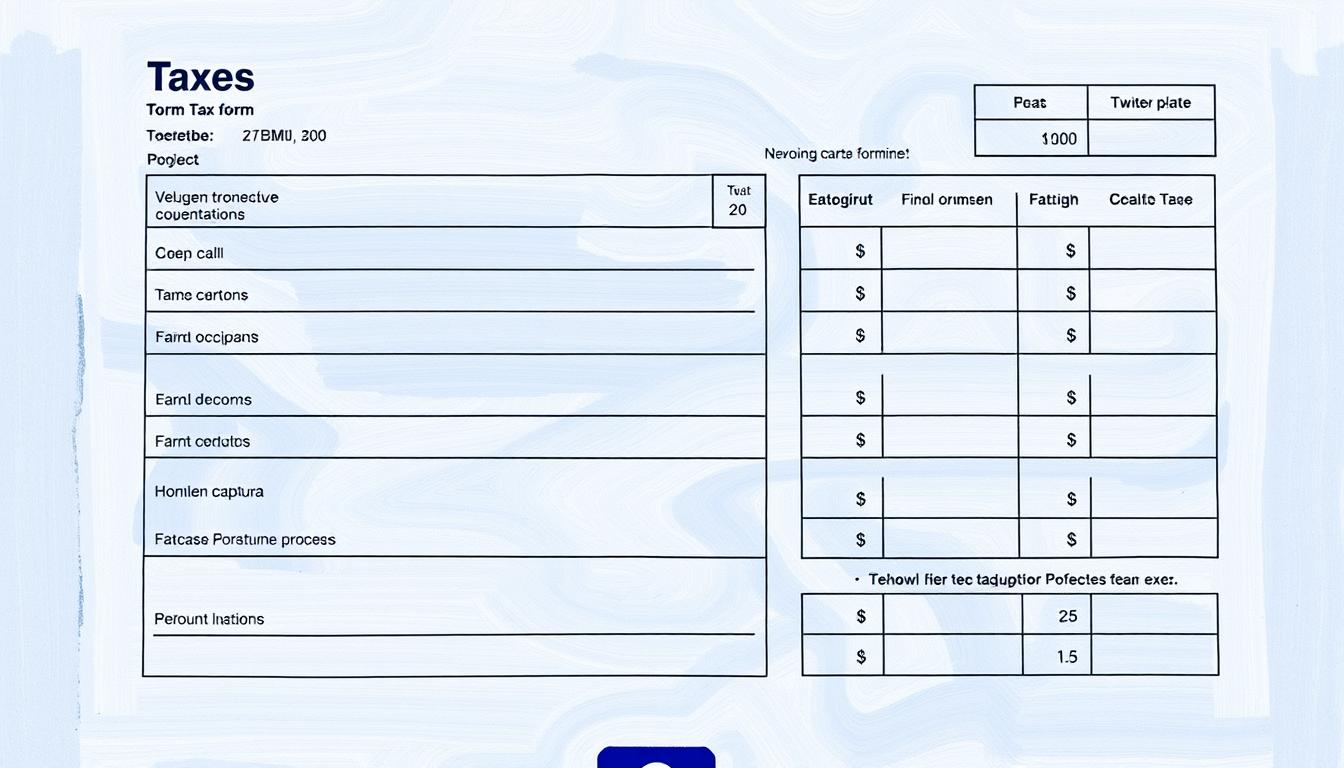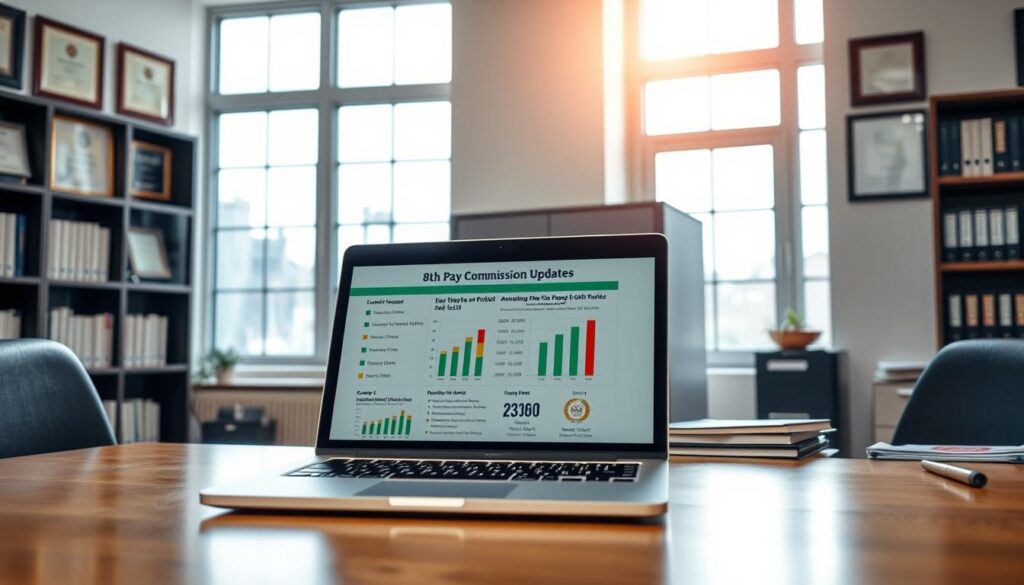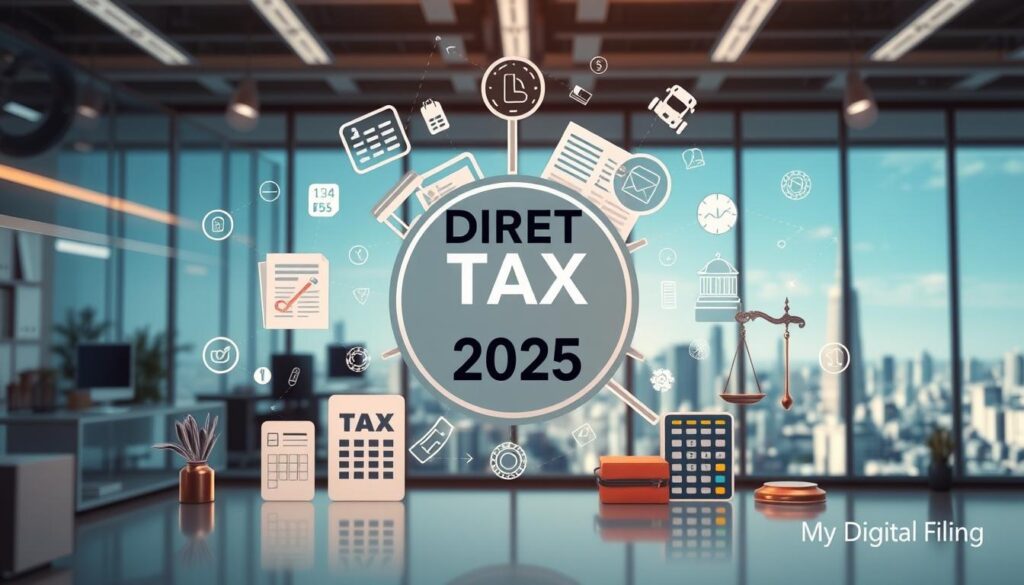Are you a small business owner or professional finding taxes hard to handle? The Presumptive Taxation Scheme could be your answer. It makes filing taxes easier and reduces the need for detailed records. This lets you focus more on your business or practice.
We’ll explore the main points, who can use it, and its advantages. This will help you make smart choices and manage your taxes better. It’s great for sole proprietors, partnerships, or professionals in certain fields. Knowing about this scheme can make tax time less stressful.
Key Takeaways
- The Presumptive Taxation Scheme simplifies tax compliance for small businesses and professionals in India.
- Eligible entities can opt for a fixed percentage of their gross receipts as their taxable income, without the need for extensive record-keeping.
- The scheme offers benefits such as exemptions from maintaining books of accounts and tax audits, while still allowing for deductions under Section 80.
- Professionals in specified fields, such as medicine, law, and engineering, can benefit from the Presumptive Taxation Scheme by reporting 50% of their gross receipts as taxable income.
- The Budget 2023 has revised the turnover limits for the Presumptive Taxation Scheme, making it more accessible to small businesses and professionals.
What is Presumptive Taxation Scheme?
The Presumptive Taxation Scheme is a simple way to handle taxes for small businesses and professionals. It makes tax work easier by letting people declare their income at a set rate. They don’t need to keep detailed records or go through audits.
Objectives and Key Features of Presumptive Taxation
This scheme aims to make taxes easier and reduce the tax load. It helps small businesses and professionals by making things simpler. Key features include:
- Simplified tax calculation based on a prescribed rate of turnover or gross receipts
- Turnover limits for eligibility, currently revised to ₹3 crore for small businesses and ₹75 lakh for professionals
- Exemptions from maintaining detailed books of accounts and undergoing tax audits
- Consistent advance tax payment requirements, with 100% due by March 15th
This scheme offers a smooth tax experience for small taxpayers. It lets them focus on their work while handling their taxes easily.
“The Presumptive Taxation Scheme has been a game-changer for small businesses, enabling them to navigate the tax landscape with ease and confidence.”
| Feature | Businesses | Professionals |
|---|---|---|
| Turnover Limit | ₹3 crore | ₹75 lakh |
| Presumptive Income | 8% of turnover (6% for digital transactions) | 50% of gross receipts |
| Maintenance of Books | Exempted | Required if income is offered below 50% of gross receipts |
| Tax Audit | Exempted up to ₹1 crore (can be increased to ₹10 crore) | Required if gross receipts exceed ₹1.5 lakh |
Eligibility Criteria for Presumptive Taxation
The presumptive taxation scheme in India makes tax easier for some taxpayers and businesses. To qualify, you must meet certain rules about your business size and what you do.
Only certain people can use this scheme. These include resident individuals, Hindu Undivided Families (HUFs), and some partnership firms. They must work in approved business areas. This includes small businesses and certain professions.
The scheme has different rules for different groups. For example, small businesses can join if their sales are less than ₹2 crores. If most of their sales come from digital sources, the limit is ₹3 crores. Professionals with less than ₹50 lakh in sales can also join.
| Section | Turnover/Gross Receipts Limit | Eligible Businesses/Professions |
|---|---|---|
| 44AD | Less than ₹2 crores (or ₹3 crores if 95% digital receipts) | Small businesses, excluding specific sectors like goods carriage or commission-based activities |
| 44ADA | Gross receipts below ₹50 lakh | Specified professions like medical, legal, engineering, accountancy, architecture, and more |
| 44AE | No specific turnover limit, but limited to owning 10 goods carriages | Individuals engaged in the business of plying, hiring, or leasing goods carriages |
Following these rules makes tax easier for taxpayers. It also brings benefits from the presumptive taxation scheme.
Sections Governing Presumptive Taxation in India
The Income Tax Act in India has rules for Presumptive Taxation. These rules make it easier for some businesses and jobs to figure out their taxes. They offer benefits like less paperwork and lower tax rates.
Section 44AD: Small Businesses and Firms
Section 44AD of the Income Tax Act helps small businesses and firms. It covers resident individuals, Hindu Undivided Families (HUFs), and partnerships (not Limited Liability Partnerships) in most businesses. They can simplify their taxes by paying 8% of their total sales or earnings.
This scheme is for businesses making less than ₹2 crores a year.
Section 44ADA: Specified Professions
Section 44ADA is for certain jobs like lawyers, doctors, engineers, and accountants. These professionals can pay taxes at a 50% rate of their earnings. This is for earnings up to ₹50 lakh a year.
Section 44AE: Plying, Hiring, or Leasing Goods Carriages
Section 44AE is for those in the goods carriage business. There’s no limit on earnings, but there’s a rule on how many vehicles you can own. Each vehicle type has a set tax amount.
These parts of the Income Tax Act make taxes easier for small businesses, certain jobs, and goods transporters. They help these groups follow their tax rules more easily.
Benefits of Presumptive Taxation Scheme
The Presumptive Taxation Scheme has many benefits for taxpayers in India. It greatly reduces the need to keep detailed records or go through audits. This makes filing taxes much easier.
Under this scheme, calculating your income is simple. You just use a fixed percentage of your business’s sales or total earnings. Choosing the 6% rate for businesses using digital payments adds an extra incentive to use digital methods.
One big plus is how easy it is to pay your taxes on time. You only need to pay your full advance tax by March 15 of the financial year. This means you don’t have to pay in installments every quarter. It makes following the rules easier for small businesses and professionals.
The scheme is especially helpful for small businesses and professionals. The Budget 2023 increased the limit for small businesses to ₹3 crores and for professionals to ₹75 lakhs. This makes the scheme more useful for more people.
In summary, the Presumptive Taxation Scheme has many benefits. These include reduced compliance burden, ease of tax calculation, and timely tax payment. It’s great for small businesses and professionals. It helps them manage their taxes better and focus on their work.
Businesses and Professions Not Eligible for Section 44AD
The Presumptive Taxation Scheme under Section 44AD makes taxes easier for small businesses. But, some businesses and professions can’t use this scheme. These include lawyers, doctors, and accountants under Section 44AA(1), agency businesses, and those making money from commission or brokerage. Also, businesses that run goods vehicles for transport under Section 44AE are not eligible.
Specific Codes Not Eligible for Section 44AD
Businesses under Sections 44AE, 44BB, and 44BB are not in the presumptive taxation scheme of Section 44AD. Also, those with certain ITR business codes can’t use this scheme. These include:
- Computer and related services
- Software development
- Data processing
- IT-enabled services
- BPO services
- Healthcare services, including hospitals, clinics, and diagnostic centers
- Medical practices
- Legal services
- Accounting and tax consultancy
- Architectural and engineering services
- Interior decoration
- Cultural activities
To be eligible for the presumptive taxation scheme under Section 44AD, your total turnover or gross receipts must be less than INR 2 Crores. This applies to resident individuals, Hindu Undivided Families (HUFs), and partnership firms (excluding LLPs).
| Eligibility Criteria | Presumptive Taxation Scheme 44AD | Presumptive Taxation Scheme 44ADA |
|---|---|---|
| Gross Receipts/Turnover Limit | Up to INR 2 Crore | No Limit |
| Applicable Entities | Resident Individuals, HUFs, Partnership Firms (Excluding LLPs) | Resident Individuals, HUFs, Partnership Firms (Excluding LLPs) |
| Presumptive Income | 8% of Gross Receipts/Turnover | 50% of Gross Receipts |
| Professions Covered | Not Specified | Specified Professions under Section 44AA(1) |
| GST Compliance | Mandatory | Mandatory |
Knowing the rules of the Presumptive Taxation Scheme helps businesses. It lets them get the most benefits and make tax compliance easier.
Presumptive Taxation Scheme for Small Businesses
For small businesses in India, choosing the right legal entity is key with the Presumptive Taxation Scheme. This scheme is for individuals, Hindu Undivided Families (HUFs), and partnerships (not Limited Liability Partnerships or LLPs).
Selecting the Legal Entity
The Presumptive Taxation Scheme is a simple tax plan for small businesses. It lets you figure out your taxable income by using a fixed percentage of your total sales. You don’t need to keep detailed books of accounts.
Maintaining Books of Accounts
If your business makes more than ₹1.2 lakh or your sales hit ₹10 lakh in the past three years, you must keep books of accounts. But, individuals and HUFs only need to do this if their income is over ₹2.5 lakh or sales hit ₹25 lakh.
Tax Audit
Businesses making over ₹1 crore in sales need a tax audit. But, if your cash dealings are less than 5% of your total, the limit goes up to ₹10 crore.
Computation of Income under Presumptive Taxation
With the presumptive taxation scheme, you calculate income as a set percentage of your sales or receipts. This is 8% for cash deals or 6% for digital ones.
| Presumptive Taxation Scheme | Income Calculation |
|---|---|
| Section 44AD: Small Businesses and Firms | 8% of total turnover/gross receipts for non-digital transactions, 6% for digital transactions |
| Section 44ADA: Specified Professions | 50% of total gross receipts |
| Section 44AE: Plying, Hiring, or Leasing Goods Carriages | Fixed amount per vehicle per month/per day |
Choosing the Presumptive Taxation Scheme makes tax easier for small businesses. It cuts down on the work of keeping detailed books of accounts.
International Transactions under Presumptive Taxation
If you work with clients from other countries, the Presumptive Taxation Scheme applies to you. Here’s what you need to know:
- If your foreign client takes out taxes before paying you, you can get credit for those taxes when you file your taxes.
- But, if there’s no TDS taken out, you must add the money to your total income. You’ll then have to pay tax on it. You also need to think about paying advance tax based on your expected yearly income from all sources.
The Presumptive Taxation Scheme makes taxes easier for small businesses, even those with clients from other countries. By following the rules, you can stay in line with the law. This way, you don’t have to deal with complex accounting or audits, even if you work with clients worldwide.
| Scenario | Tax Treatment |
|---|---|
| Foreign client deducts taxes | Claim credit for taxes paid overseas in your return of income |
| No TDS deducted by foreign client | Include receipts in total income, pay applicable tax, and consider advance tax requirements |
The Presumptive Taxation Scheme is made to make filing taxes easier for international transactions, presumptive taxation, TDS, and advance tax needs. By using this scheme, you can grow your business. At the same time, you’ll make sure you’re following Indian tax laws.
Presumptive Taxation for Professionals
The Presumptive Taxation Scheme under Section 44ADA helps resident individuals and partnership firms. These include those in legal, medical, engineering, architectural, accountancy, technical consultancy, and interior decoration fields. They must keep books of accounts if their income is over ₹1.5 lakh for three years in a row.
Specified Professions for the Purpose of Indian Tax Laws
Here are the professions covered by Section 44ADA:
- Legal professionals (lawyers, advocates, solicitors, etc.)
- Medical professionals (doctors, surgeons, dentists, etc.)
- Engineering professionals (civil, mechanical, electrical, etc.)
- Architectural professionals
- Accountancy professionals (chartered accountants, cost accountants, etc.)
- Technical consultancy professionals
- Interior decoration professionals
Maintenance of Books of Accounts
Professionals under the presumptive taxation scheme need to keep certain records. These include:
- Cash book
- Journal
- Ledger
- Copies of bills or receipts
These records are needed if their profession’s income is over ₹1.5 lakh for three years in a row.
Computation of Taxable Income
To figure out taxable income, subtract profession-related expenses from total income. The presumptive income is 50% of the total income. If needed, professionals can declare more expenses, but they must keep detailed records and documents.
| Key Highlights | Details |
|---|---|
| Presumptive Income | 50% of Gross Receipts |
| Limit for Gross Receipts | ₹75 lakh (revised from ₹50 lakh for FY 2023-24) |
| Eligibility | Resident individuals and partnership firms (other than LLPs) |
| Specified Professions | Legal, medical, engineering, architectural, accountancy, technical consultancy, and interior decoration |
| Maintenance of Books | Required if gross receipts exceed ₹1.5 lakh in any of the three preceding years |
Budget 2023 Updates on Presumptive Taxation Limits
The Union Budget 2023 has brought big changes to the presumptive taxation limits under Sections 44AD and 44ADA of the Income Tax Act. These updates aim to ease the tax burden for small businesses and professionals in India.
The turnover limit for small businesses under Section has jumped from ₹2 crore to ₹3 crore. This change is for the financial year 2023-24 (the assessment year 2024-25). Now, businesses with a turnover up to ₹3 crore can use the presumptive taxation scheme. They just need to make sure their cash receipts don’t go over 5% of their total receipts.
Professionals under Section 44ADA now have a higher limit, from ₹50 lakh to ₹75 lakh. This is great news for professionals like doctors, lawyers, and chartered accountants. They can use the presumptive taxation scheme if their total gross receipts don’t hit ₹75 lakh and their cash receipts are under 5% of the total.
These changes to presumptive taxation limits will greatly help small businesses and professionals. They will make tax compliance easier and lessen the need for detailed records. By increasing the limits, the government wants more taxpayers to choose the presumptive taxation scheme. This will make the tax system more friendly and efficient for small and medium businesses.
The Budget 2023 also removes the audit need for individuals using the presumptive income schemes of Sections 44AD or 44ADA. This makes taxation smoother for eligible taxpayers. These new rules start from the financial year 2023-24 (the assessment year 2024-25).
The budget 2023 updates on presumptive taxation limits for small businesses and professionals will really help the Indian economy grow. Especially in the small businesses and professional fields.
Conclusion
The Presumptive Taxation Scheme in India makes tax easier for small businesses and professionals. It cuts down on paperwork and avoids audits. This makes tax filing simpler. The limits for Sections 44AD and 44ADA have gone up, helping more small taxpayers use this scheme.
This scheme is a big help for simplifying taxes and getting small businesses and professionals to follow the rules. It’s great for small businesses, goods carriers, or professionals. It reduces paperwork, makes tax calculations easier, and can save you money.
Using the Presumptive Taxation Scheme lets you focus on growing your business or practice. You won’t get stuck with complicated tax rules. With the updated limits, now is a good time to see how this simpler tax approach can help you stay compliant.
FAQ
Q: What is the Presumptive Taxation Scheme?
A: The Presumptive Taxation Scheme is a simple way to pay taxes. It helps small businesses and professionals by letting them pay taxes based on their income. They don’t need to keep detailed records or go through audits.
Q: What are the key objectives and features of the Presumptive Taxation Scheme?
A: The main goals of this scheme are to make taxes easier and reduce the tax load. It helps businesses run smoothly and treats all eligible businesses fairly. Key features include easy tax calculations, certain turnover limits, and not needing to keep detailed records or go through audits.
Q: Who is eligible for the Presumptive Taxation Scheme?
A: Some taxpayers and businesses can use this scheme. They must meet certain conditions about their income and the type of business they do. Eligible ones include individuals, Hindu Undivided Families (HUFs), and some partnership firms.
Q: What are the different sections of the Income Tax Act that govern the Presumptive Taxation Scheme?
A: The scheme is covered by several sections of the Income Tax Act. These include: – Section 44AD for small businesses with a turnover up to ₹3 crore – Section 44ADA for certain professions with a turnover up to ₹75 lakh – Section 44AE for businesses related to goods carriages
Q: What are the benefits of the Presumptive Taxation Scheme?
A: This scheme has many benefits. It makes paying taxes easier and less complicated. You don’t need to keep detailed records or go through audits. The tax is calculated simply as a percentage of your income. It also makes paying taxes on time easier.
Q: Which businesses and professions are not eligible for the Presumptive Taxation Scheme under Section 44AD?
A: Some businesses and professions can’t use this scheme. This includes certain professionals, agency businesses, and those earning from commission or brokerage. Also, businesses related to transporting goods are not eligible.
Q: What are the key considerations for small businesses opting for the Presumptive Taxation Scheme?
A: Choosing the right legal form is important for small businesses using this scheme. It’s only for individuals, HUFs, and some partnership firms. You must keep records if your income is over ₹1.2 lakh or your sales are over ₹10 lakh in the past three years. The tax is 8% for cash transactions or 6% for digital ones.
Q: How does the Presumptive Taxation Scheme work for taxpayers with international transactions?
A: If you deal with international transactions, this scheme still applies. If taxes were deducted by the foreign client, you can claim those taxes back in your return. If no taxes were deducted, you must include the income in your taxes and pay the tax due. You also need to consider advance tax based on your expected income.
Q: What are the key provisions for professionals under the Presumptive Taxation Scheme (Section 44ADA)?
A: Professionals can use this scheme if they are individuals or partnership firms in certain fields. You must keep records if your income is over ₹1.5 lakh in the past three years. Your taxable income is half of your total income after deducting profession-related expenses.
Q: What are the recent updates to the Presumptive Taxation Scheme in Budget 2023?
A: The Budget 2023 made some changes to this scheme. The limit for small businesses under Section 44AD is now ₹3 crore. For professionals under Section 44ADA, the limit is ₹75 lakh. These changes apply if your cash receipts are less than 5% of your total income.










